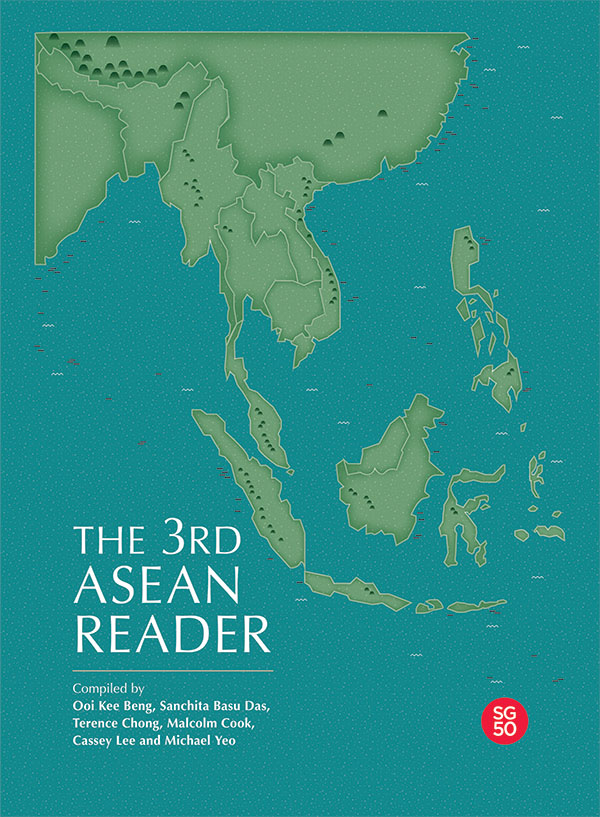Book contents
- Frontmatter
- Contents
- Preface
- Forewords to the First and Second ASEAN Reader: ASEAN: Conception and Evolution
- Forewords to the First and Second ASEAN Reader: ASEAN: The Way Ahead
- Forewords to the First and Second ASEAN Reader: New Challenges for ASEAN
- SECTION I ASEAN: THE LONG VIEW
- SECTION II COUNTRY ANALYSES
- SECTION III COMPARATIVE ANALYSES OF THE REGION
- Southeast Asian Societies
- The Southeast Asian Economy
- Southeast Asian Politics
- SECTION IV INTERNATIONAL DEVELOPMENTS
- Section Introduction by
- 25 Is There a Southeast Asian Development Model?
- 26 Global Production Sharing, Trade Patterns, and Industrialization in Southeast Asia
- 27 Chinese Trade Policy After (Almost) Ten Years in the WTO: A Post-Crisis Stocktake
- 28 Southeast Asia Beyond the Global Financial Crisis: Managing Capital Flows
- 29 Impact of Eurozone Financial Shocks on Southeast Asian Economies
- 30 The Collective Influence of Smaller States in the US-China Security Dilemma
- 31 China and Japan in “ASEAN Plus” Multilateral Arrangements: Raining on the Other Guy's Parade
- SECTION V INSTITUTIONS OF ASEAN
- SECTION VI ASSESSING ASEAN'S INTERNAL POLICIES
- ASEAN Political Security Community
- ASEAN Economic Community
- ASEAN Socio-Cultural Community
- SECTION VII ASSESSING ASEAN'S EXTERNAL INITIATIVES
- ASEAN Processes
- ASEAN's Major Power Relations
- SECTION VIII SOUTHEAST ASIA: PERIPHERAL NO MORE
- Bibliography
- The Contributors
- The Compilers
30 - The Collective Influence of Smaller States in the US-China Security Dilemma
from SECTION IV - INTERNATIONAL DEVELOPMENTS
Published online by Cambridge University Press: 22 June 2017
- Frontmatter
- Contents
- Preface
- Forewords to the First and Second ASEAN Reader: ASEAN: Conception and Evolution
- Forewords to the First and Second ASEAN Reader: ASEAN: The Way Ahead
- Forewords to the First and Second ASEAN Reader: New Challenges for ASEAN
- SECTION I ASEAN: THE LONG VIEW
- SECTION II COUNTRY ANALYSES
- SECTION III COMPARATIVE ANALYSES OF THE REGION
- Southeast Asian Societies
- The Southeast Asian Economy
- Southeast Asian Politics
- SECTION IV INTERNATIONAL DEVELOPMENTS
- Section Introduction by
- 25 Is There a Southeast Asian Development Model?
- 26 Global Production Sharing, Trade Patterns, and Industrialization in Southeast Asia
- 27 Chinese Trade Policy After (Almost) Ten Years in the WTO: A Post-Crisis Stocktake
- 28 Southeast Asia Beyond the Global Financial Crisis: Managing Capital Flows
- 29 Impact of Eurozone Financial Shocks on Southeast Asian Economies
- 30 The Collective Influence of Smaller States in the US-China Security Dilemma
- 31 China and Japan in “ASEAN Plus” Multilateral Arrangements: Raining on the Other Guy's Parade
- SECTION V INSTITUTIONS OF ASEAN
- SECTION VI ASSESSING ASEAN'S INTERNAL POLICIES
- ASEAN Political Security Community
- ASEAN Economic Community
- ASEAN Socio-Cultural Community
- SECTION VII ASSESSING ASEAN'S EXTERNAL INITIATIVES
- ASEAN Processes
- ASEAN's Major Power Relations
- SECTION VIII SOUTHEAST ASIA: PERIPHERAL NO MORE
- Bibliography
- The Contributors
- The Compilers
Summary
Sino-US disquiet over East Asia in recent years highlight the collective role that non-leading regional states have in exacerbating security dilemmas between major powers at moments of power transition. Security dilemmas occur when actors view their own attempts to enhance security as benign, but are seen as threatening by others — particularly competitors. Defending against perceived threats may consequently agitate potential rivals and ironically make other actors feel less secure. How regional states from Japan and Korea, through various ASEAN members along with Australia, individually respond to Chinese and US initiatives can unfortunately further aggravate Sino-US suspicions, even if inadvertently. After all, support from regional actors has influence on the success of bilateral, as well as multilateral, initiatives, arrangements, and institutions that ground US and Chinese efforts to maintain or modify the prevailing order in East Asia.
COOPERATION, TRANSITION, AND FRICTION
Regardless of whether power transition is real or perceived, expectations about substantial shifts in international politics can be disconcerting. The preeminent power — the United States in this case — worries about how to best maintain its interests and leading position, whereas the emergent power — China — frets about ways to sustain and entrench its growing prominence, while simultaneously addressing potential challenges impeding its rise. Beijing views its efforts to establish preeminence in East Asia as a natural expression of China's rights, while Washington sees retaining regional leadership as a preservation of long-standing American interests. Neither the United States nor China appear completely comfortable with fuller expressions of each other's goals in this regard, especially given uncertainties over the pace of power transition and the long-term viability of each other's competitive positions.
Individual choices that regional states make under such conditions of flux collectively influence the severity of the Sino-US security dilemma by affecting the context and environment in which Washington and Beijing operate. Govern-ments from Tokyo to Jakarta are figuring out whether and how much political capital to commit to existing arrangements, as well as when and how to seek alternatives that may involve a reduced US role. A tepid and slow readjustment from existing US-backed frameworks may result in a regional state missing new opportunities, while a too rapid and drastic response could potentially result in foregoing — or even undermining — key public goods and benefits the current system provides.
- Type
- Chapter
- Information
- The 3rd ASEAN Reader , pp. 157 - 159Publisher: ISEAS–Yusof Ishak InstitutePrint publication year: 2015



